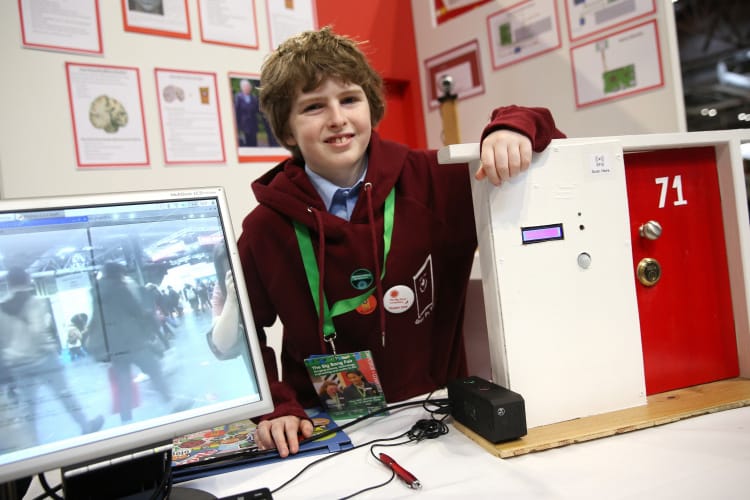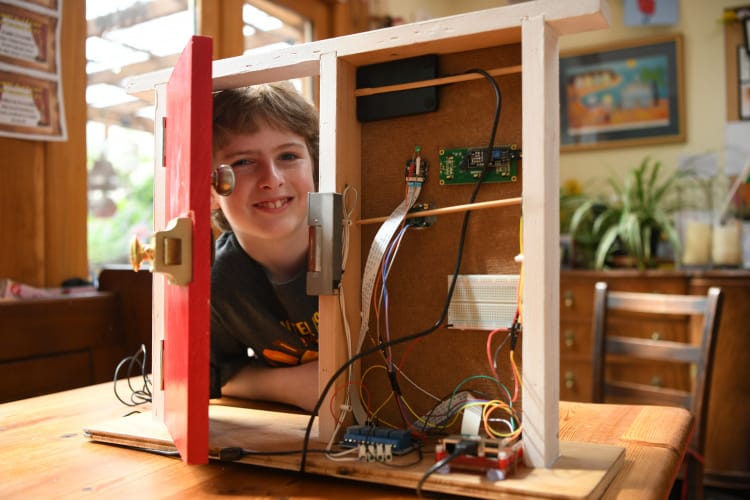
Collaborate to Innovate 2019
Category: Young Innovator
Winner: Facial Recognition Door Entry System and Home Monitoring System for the Elderly
Partners: Freddie Howells with CETEC
Category Sponsor: Solidworks
The winning entry to this year’s Young Innovator category - a system aimed at helping vulnerable elderly people live safely and independently in their own homes - provided the C2I judging panel with plenty of reasons to be optimistic about the future pipeline of engineering talent.
Inspired by the challenges facing his great Aunt Pat, who lives alone at home with dementia, Freddie Howells developed a facial recognition door entry system to protect her from unwanted visitors alongside a suite of home monitoring technologies to check up on her welfare.
READ ABOUT THE OTHER C21 2019 WINNERS
Developed by Freddie when he was just 12 years old (he’s just turned 14) the system was created using a Raspberry Pi microcomputer.
For the entry system a PIR motion sensor attached to the front door triggers a camera to take an image when motion is detected.
This is compared against a database of known faces and if the face is recognised, the visitor is prompted to scan their ID tag for 2 factor authentication. If the face and ID tag match, the door is opened via means of a 5V single channel relay attached to a 12V electric door strike. If they’re not recognised or do not match, the user is prompted to call a number to gain access.
When the visitor gains access, a text is sent to the family alerting them to who has visited and when. At the same time an audio recording of the visitor's voice is played in the elderly person's room so they know who is visiting.
Freddie has also installed various monitoring devices around the home including a motion sensor which triggers a text alert if there is no motion for a period of time, and temperature and humidity sensors which will automatically turn on a fan if the temperature gets too hot. He’s also installed a webcam which can be used for remote monitoring and a voice-activated intercom system that enables two-way communication without the need for the phone.
Whilst initially inspired by the challenges faced by his great Aunt, Freddie believes that his system could help ultimately improve the quality of life for many more people. Indeed, around one in six of over 80's are affected by dementia, and one third of these live alone.

“These people are vulnerable and often the cause of huge concern to family members who may well live great distances from their loved ones,” he said. “If we are to enable individuals to live independently at home for longer then there is a need to embrace technology to support them.”
Freddie has been supported throughout the project by assistive technology expert Firas Sarhan, director of the Centre of Excellence for Technology Enhanced Care (CETEC) at Barnet Southgate college in North London.
He explained that working with CETEC was particularly helpful in terms of developing the system for monitoring and controlling the temperature and humidity of the home, an important factor for any elderly or housebound people who might be particularly prone to chest infections.
“Working with someone like Firas, who is a leader in my project field, has provided me with the insight as to how this project could potentially be utilised in homes across the UK,” he said.
Freddie added that working with Firas has also helped him understand how his future career might progress. “His input has helped me realise how my interests and skills can lead to a career in engineering and the multitude of areas in which an engineer can work that I hadn't considered before.”
Freddie’s mother Sarah Howells told The Engineer that Freddie has always been interested in engineering and been very creative since a young age. This interest was piqued partly by his introduction to Scratch, a block-based visual programming language aimed at children, by a family friend, Dr James Osborne, who is a senior lecturer at Cardiff University’s National Software Academy. “Freddie quickly moved on to coding in Python and started exploring the world of Physical Computing which is really where his passion lies,” she added.
Freddie is now exploring the world of wearable assistive technology and looking at how he can help both people with dementia and people with Parkinson’s. “Ambitions wise, he is already talking about universities,” said his mother. “He is keen to explore computer science and engineering but isn’t sure exactly what path that will take him down, although I’m sure he’ll have many options open to him!”
The Young Innovator category is sponsored by Solidworks
The headline sponsor for C2I 2019 is Frazer-Nash Consultancy





Poll: Should the UK’s railways be renationalised?
All public service companies should be nationalised for many different reasons, particularly railways, not the least because the tax payer has already...